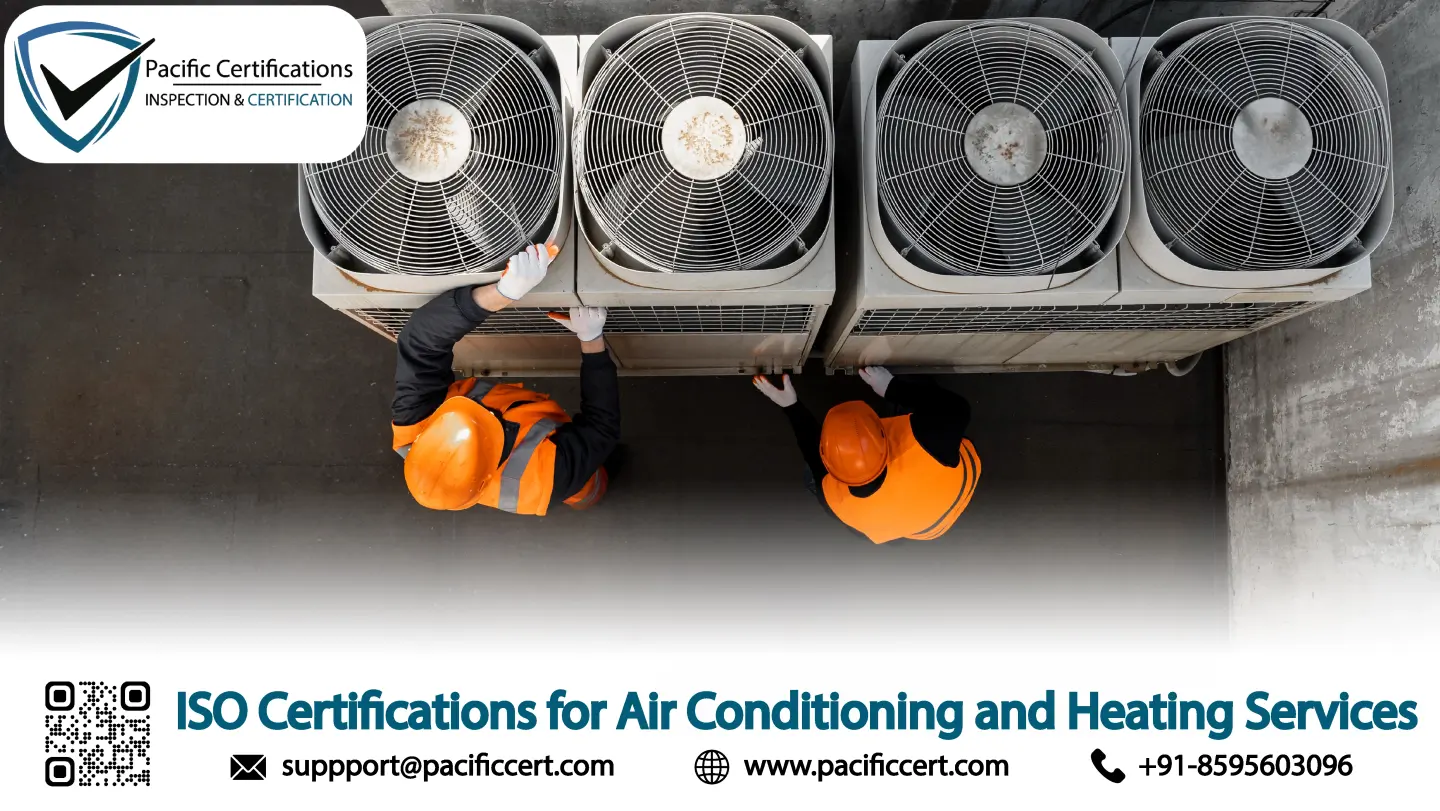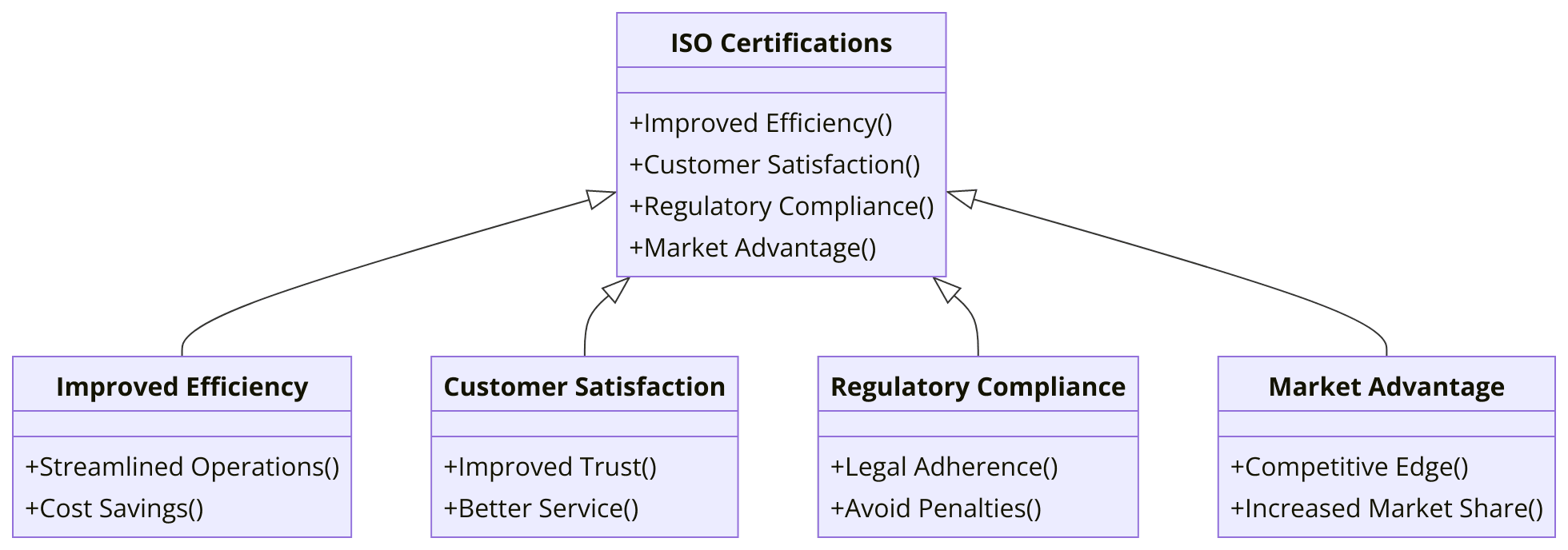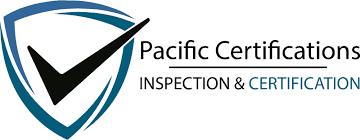ISO Certifications for Air Conditioning and Heating Services, Requirements and Benefits

Introduction
Air conditioning and heating services are essential for almost every sector that depends on indoor comfort and regulated environments. As buildings become smarter and more energy-dependent, the role of HVAC (Heating, Ventilation, and Air Conditioning) companies has expanded far beyond installation. They are now expected to provide energy-efficient systems, reduce emissions, maintain safety, and deliver reliable servicing.
The market for air conditioning and heating services has been growing steadily. Global demand for HVAC systems was valued at more than USD 150 billion in 2023 and is projected to cross USD 250 billion by 2030, largely due to rising urbanization, climate change, and stricter building energy codes. At the same time, clients are asking for proof of quality and accountability. ISO certifications give companies in this sector a way to show that their safety practices and environmental controls meet international expectations.
To get your certification process started, contact us at [email protected].
For businesses in heating and cooling, ISO certifications all are about proving reliability in comfort, safety, and sustainability.
Quick Summary
ISO certifications help air conditioning and heating service providers deliver safer, more efficient, and environmentally responsible solutions. The key standards are ISO 9001 (quality), ISO 45001 (safety), ISO 14001 (environment), and ISO 50001 (energy). Certification builds client confidence, supports compliance, and gives HVAC companies an edge in a highly competitive market.
Applicable ISO standards for Air Conditioning and Heating Services
For air conditioning and heating services, several ISO standards are applicable to ensure quality, safety, and environmental responsibility. Here are some of the key ISO standards relevant to this industry:
ISO 9001: Quality Management System (QMS)
ISO 9001 sets the foundation for a robust quality management system. It is applicable to all businesses and can help air conditioning and heating service providers improve customer satisfaction, streamline processes, and enhance overall quality.
ISO 14001: Environmental Management System (EMS)
ISO 14001 focuses on environmental responsibility. For HVAC services, it can help in managing the environmental impact of operations, including energy efficiency, waste reduction, and the responsible use of refrigerants.
ISO 45001: Occupational Health and Safety Management System (OHSMS)
The safety of technicians and workers is paramount in the air conditioning and heating services industry. ISO 45001 helps identify and mitigate occupational health and safety risks, ensuring a safe working environment.
ISO 50001: Energy Management System (EnMS)
Energy efficiency is a critical concern in HVAC services due to energy consumption in heating and cooling systems. ISO 50001 helps in establishing energy management practices to reduce energy costs and environmental impact.
ISO 26000: Social Responsibility
This standard is focused on the social responsibility of organizations. While not specific to HVAC services, it can guide companies in ethical business practices and corporate social responsibility.
ISO 23953: Refrigerated storage and display equipment
ISO 23953 pertains specifically to the design and testing of refrigerated storage and display equipment, which is highly relevant to air conditioning and refrigeration service providers.
ISO 5149: Refrigerating Systems and Heat Pumps
ISO 5149 addresses the safety and environmental aspects of refrigeration systems and heat pumps, ensuring their safe installation and maintenance.
ISO 817: Solar Heating for Domestic Water
If your services involve solar heating systems, ISO 817 provides guidelines for the design, installation, and maintenance of such systems.
ISO 19467: Ventilation for Buildings - CFD simulation for contaminant transport
This standard focuses on the ventilation aspect of HVAC systems, particularly in buildings, and provides guidance on computational fluid dynamics (CFD) simulation for contaminant transport.
ISO 29400: Ventilation for buildings - Air terminal devices - Performance testing and rating
This standard deals with the performance testing and rating of air terminal devices in HVAC systems, ensuring they meet the necessary performance criteria.
These ISO standards help air conditioning and heating service providers to establish best practices from quality to energy management.
What are the requirements of ISO Certifications Air Conditioning and Heating Services?
Obtaining ISO certifications for air conditioning and heating services involves meeting specific requirements outlined in the respective ISO standards. Below are some of the general requirements:
ISO 9001 - Quality Management System (QMS) Requirements
Quality Policy: Develop and implement a documented quality policy that outlines your commitment to meeting customer requirements and continuously improving quality.
Documented Processes: Establish and maintain documented processes for all key aspects of your business, including service provision, customer communication, and internal audits.
Risk Management: Identify and assess risks and opportunities relevant to your services. Implement measures to address these risks and opportunities.
Customer Focus: Ensure that customer requirements and expectations are understood, communicated, and met consistently.
Resource Management: Allocate and manage resources, including personnel and equipment, to meet quality objectives and customer needs.
Monitoring and Measurement: Implement processes for monitoring and measuring the performance of your services, including customer satisfaction and service quality.
Continuous Improvement: Continuously identify areas for improvement and take corrective and preventive actions when necessary.
ISO 14001 - Environmental Management System (EMS) Requirements
Environmental Policy: Develop and communicate an environmental policy that outlines your commitment to minimizing the environmental impact of your services.
Legal Compliance: Ensure compliance with relevant environmental laws and regulations applicable to your industry.
Environmental Aspects: Identify and assess the environmental aspects and impacts of your services, including energy consumption and waste generation.
Objectives and Targets: Set environmental objectives and targets, along with action plans to achieve them, such as reducing energy consumption or minimizing the use of environmentally harmful refrigerants.
Training and Awareness: Train your employees to understand their roles and responsibilities in environmental management.
Emergency Preparedness: Develop and implement emergency preparedness and response procedures for potential environmental incidents.
ISO 45001 - Occupational Health and Safety Management System (OHSMS) Requirements
Health and Safety Policy: Establish a documented health and safety policy that demonstrates your commitment to providing a safe working environment.
Hazard Identification and Risk Assessment: Identify workplace hazards, assess risks, and implement controls to mitigate or eliminate them.
Legal Compliance: Ensure compliance with relevant health and safety laws and regulations.
Training and Competence: Provide training and ensure the competence of employees to perform their tasks safely.
Incident Reporting and Investigation: Implement procedures for reporting and investigating workplace incidents and accidents.
Emergency Preparedness: Develop and maintain emergency response plans to address potential health and safety emergencies.
General requirements:
Defining the scope of services: Companies must identify whether they focus on installation, servicing, energy audits, or a combination of all three.
Policies and objectives: Written commitments to quality, safety, and environmental care must be part of management’s responsibility.
Risk assessments: Evaluating potential hazards such as refrigerant leaks, electrical faults, or workplace accidents is essential.
Documented processes: From installation checklists to emergency call-out procedures, everything must be written and standardized.
Training programs: Technicians need training in equipment handling, safety practices, and compliance with environmental regulations.
Records and evidence: Service reports, maintenance logs, inspection results, and accident records should be maintained systematically.
Performance monitoring: Key indicators such as service completion time, equipment failure rates, and energy efficiency results must be tracked.
Internal audits: Regular checks are carried out to ensure the system is functioning as planned and improvements are made.
Tip: HVAC companies should start with ISO 9001 to set up quality systems, followed by ISO 45001 to cover technician safety.
What are the benefits of ISO Certifications Air Conditioning and Heating Services Providers?
Obtaining ISO certification can bring several significant benefits to air conditioning and heating services companies. Here are some of the key benefits:

ISO certifications provide assurance to customers that your company is dedicated to delivering high-quality services.
Implementing ISO 9001 standard can help improve your operations, reduce errors, and improve service quality.
ISO certifications can differentiate your company from competitors.
ISO 45001 can lead to a safer work environment, fewer accidents and reduced liability for the company.
ISO 14001 certification demonstrates your commitment to environmental sustainability.
ISO certifications often include a focus on complying with relevant laws and regulations.
ISO standards encourage efficient and effective management practices.
ISO certifications can open doors to new markets and clients that have these requirements.
ISO standards promote a culture of continuous improvement.
ISO certifications are recognized globally. They can enhance the confidence of stakeholders.
Market Trends
The HVAC industry is shifting rapidly with new technologies and regulatory pressures. Demand for energy-efficient systems is at its peak, with governments mandating stricter building codes and emissions targets. According to forecasts, over 60% of new installations by 2030 will involve energy-rated or smart systems.
Another key trend is the adoption of green refrigerants and phasing out of harmful chemicals like HFCs, which has created opportunities for companies that align with ISO 14001 and ISO 50001. The use of IoT-based smart HVAC solutions is also rising, enabling remote monitoring and predictive maintenance, which ties closely with ISO/IEC 27001 for data security.
Globally, the sector is expected to grow at 6–7% CAGR, supported by urban growth in Asia-Pacific, retrofitting in North America, and sustainability initiatives in Europe. Companies that hold ISO certifications are better positioned to gain trust, meet regulatory demands, and secure long-term contracts in this evolving market.
How Pacific Certifications Can Help?
Pacific Certifications is accredited by ABIS, we provide auditing and certification services tailored to the HVAC sector. Whether you are a local service provider or a large-scale contractor, we help align your systems with international standards so that your services are recognized for quality, safety, and sustainability.
If you need more support with ISO Certification for your business in Air Conditioning and Heating Services industry, contact us at +91-8595603096 or [email protected].
Ready to get ISO certified?
Contact Pacific Certifications to begin your certification journey today!
Author: Ashish
Read more: Pacific Blogs

